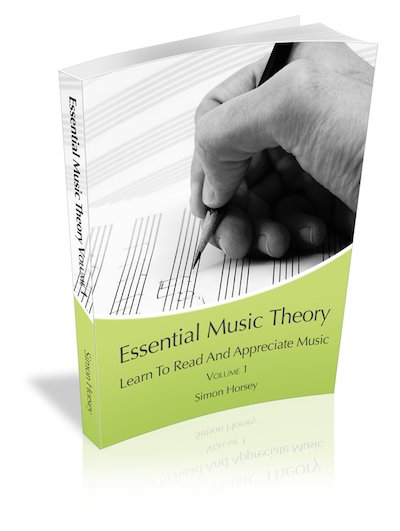The Grand Staff
The Grand Staff (also known as the Grand Stave) is basically just 2 staves joined together, with an invisible line in between them!
If you haven't already learned the order of notes on the staves please Click here for the Learn To Read Music page.
The Staves
There are two staves which make up the Grand Staff. The top stave uses the Treble Clef to identify notes and the bottom stave uses the Bass Clef.
Click the links above to learn more about the treble or bass clefs, or Click here to learn more about clefs and how they affect the notes on a stave.
The lines of the grand staff
First we look at the lines in the top stave. This is the treble clef (also called the G clef) stave. Click here for more information on the treble clef
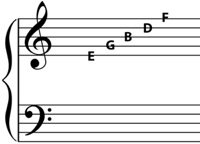
These are the first five letters of the pattern E G B D F
from the bottom line to the top line. As long as you know the order of
letters and to begin on E, you can always work out a note by starting
from the bottom line and working through the sequence of letters.
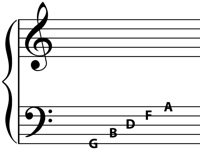
The lines on the bottom staff also follow the same sequence of letters, but for the bottom staff we begin on G. So the lines of the bottom staff are G B D F A
Test yourself
Once you have learned the lines click here for a short online test to see if you know them as well as you think you do! Remember to count from the bottom to the top of a stave. As long as you know the order of the letters and which is the bottom line you should be fine! You have 90 seconds to complete the test. Good luck!
The Spaces
The spaces on both staves also follow the pattern!
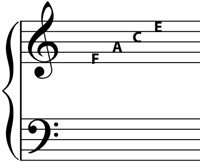
The spaces on the top staff begin on F in the sequence and because there are 4 spaces the spaces are F A C E, so the spaces in the top staff are easy to remember because they spell FACE
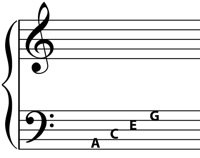
The spaces on the bottom staff begin on A in the sequence and because there are 4 spaces the spaces are A C E G.
Test yourself
Once you have learned the lines, click here for a short online test to see if you know them as well as you think you do! Remember to count from the bottom to the top of a stave. As long as you know the order of the letters and which is the bottom line you should be fine! You have 90 seconds to complete the test. Good luck!
The invisible line
There is an invisible line running through the middle of both staves! Although it is made up of two staves of five lines, the Grand Staff actually has 11 lines. You may have heard of middle C. Many people assume this is the note in the middle of the piano - well...it depends on how many keys your piano has as to whether it is or not. Middle C is the closest C to the middle of the piano, but Middle C is also the note in the middle of the Grand Staff
The staves below shows the notes on the lines and spaces including the invisible middle line (marked in red).
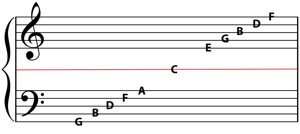
This shows all the notes on the grand staff from the bottom line of the
bass clef to the top line of the treble clef, including the middle C
line. You can now see the letter pattern is followed right from the
bottom to the top.
G B D F A C E G B D F
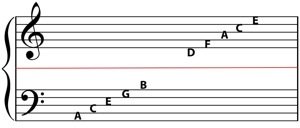
This shows all the notes on the grand staff from the bottom space of the
bass clef to the top space of the treble clef, including the B and D either side of the middle C line. You can now see the letter pattern is followed right from the bottom to the top.
A C E G B D F A C E
Putting the notes on the staves
Music notes are slightly squashed circles that are either on a line or in a space.
When a note is on a line,
the line runs through the middle of the note.
When a note is in a space
it is directly in between the lines, touching both.Here are the notes on the lines and spaces.
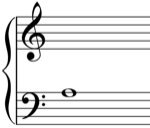
This note is on the A line in the bass clef - therefore it is A!
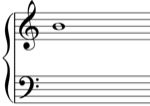
This note is on the B line in the treble clef - therefore it is B!
Once you are confident you understand how the Staff works and can name the notes Click here to take a short quiz on the notes of the Grand Staff. This quiz is not timed
so take your time and get every answer correct. Read the lines or
spaces from the bottom of the staff to help your learning and memory, as
well as get the correct answer! Good luck!
A Clear Path To Learning Music Theory
For more help check out my new theory book Essential Music Theory: Learn To Read And Appreciate Music Vol. 1 available for iPad and Mac OS.
- A simple step-by-step course that takes you from complete beginner to grade 2 music theory
- Multi-faceted learning - audio, video, mind maps, clear musical examples
- Built in quizzes to check your understanding
Click here for more information.
Or get it on the iBooks Store!
Return to Learn To Read Music from Grand Staff
Return to the Essential Music Theory Homepage


